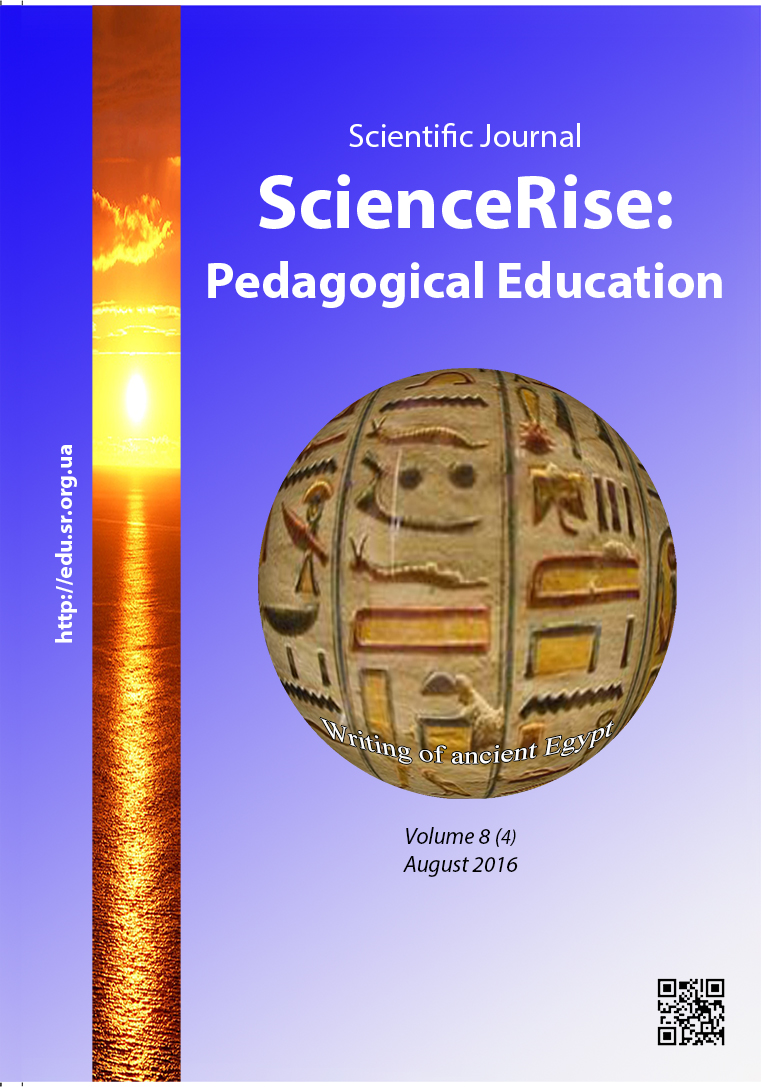Modeling of research competence formation system of the future software-engineers
DOI:
https://doi.org/10.15587/2519-4984.2016.76650Keywords:
model, modeling, software-engineers, HEI, educational environment, pedagogy, competence, research competencesAbstract
In the article it was theoretically analyzed the system of training of the future software engineers in HEI educational environment and presented the model of formation of research competence of the future software engineers in the conditions of HEI educational environment. The grounding of effective conditions of formation of the research competence of the future software engineers in the conditions of HEI educational environment provides the elaboration of theoretical model of this process. The structural-functional model of formation of the research competence of future software engineers is oriented on the development of motivation-value, cognitive and activity components of research competence of future software engineers at realization of correspondent pedagogical conditions, use of information technologies, organization of step-by-step involvement of students to the research activity, systematic monitoring of mastering the research competence by students.
In formation of research competence the important role is given to the specially organized means of training students for research activity. Among the means of formation of research competence besides the traditional ones (verbal means, textbooks, schoolbooks; visual means; models) the most effective are ICT means. The constructed model of formation of research competence of future software engineers has a system character that is provided by interconnection and mutual conditionality of its components. Theoretically grounded structural-functional model of formation of research competence of the future software engineers gives a possibility to understand the character of mutual dependence between the structural components of the process of formation of research components in students, synthesize and reveal the typical features of this process, to make correction of the separate elements if it is necessary for the optimal attainment of the set aimReferences
- Sheiko, V. M., Kushnarenko, N. M. (2008). Organizacija ta metodyka naukovo-doslidnyc'koi' dijal'nosti. Kyiv: Znannja, 310.
- Kurganov, A. V. (2008). Formirovanie gotovnosti studentov gumanitarnogo vuza k psihologo-pedagogicheskomu issledovaniju. Kazan', 21.
- Vinnyk, M. O. (2016). Naukovo-doslidnyc'ka kompetentnist' majbutnih IT-fahivciv. Pedagogichnyj al'manah, 29, 102–109.
- Spivakovsky, A., Vinnyk, M., Tarasich, Y., Poltoratskiy, M. (2016). Design and Development of Information System of Scientific Activity Indicators. CEUR Workshop Proceedings, 103–110. Available at: http://ceur-ws.org/Vol-1614
- Spivakovsky, A., Vinnyk, M., Tarasich, Y. (2015). Using ICT in Training Scientic Personnel in Ukraine: Status and Perspectives. CEUR Workshop Proceedings, 5–20. Available at: http://ceur-ws.org/Vol-1356
- Arhypova, M. V. (2010). Model' formuvannja doslidnyc'koi' kompetentnosti majbutn'ogo inzhenera-pedagoga. Visnyk Chernigivs'kogo derzhavnogo pedagogichnogo universytetu imeni T. G. Shevchenka. Pedagogichni nauky, 76, 8–11.
- Golovan', M. S. (2012). Model' formuvannja doslidnyc'koi' kompetentnosti majbutnih fahivciv u procesi profesijnoi' pidgotovky. Pedagogichni nauky: teorija, istorija, innovacijni tehnologii', 5 (23), 196–205.
- Osypova, N. V., Vinnyk, M. O., Tarasich, Ju. G. (2014). Model' formuvannja doslidnyc'koi' kompetentnosti u majbutnih inzheneriv-programistiv. Informacijni tehnologii' v osviti, 20, 150–159.
- Luzan, P. G., Sopivnyk, I. V., Vygovs'ka, S. V. (2010). Osnovy naukovo-pedagogichnyh doslidzhen'. Kyiv, 220.
- Marshalova, I. N. (2014). Model' formirovanija issledovatel'skoj kompetencii budushhih inzhenerov v uslovijah social'nogo partnjorstva (na primere Zelenodol'skogo instituta mashinostroenija i informacionnyh tehnologij KNITU-KAI. Nauchno-metodicheskij jelektronnyj zhurnal «Koncept», 20, 3966–3970. Available at: http://e-koncept.ru/2014/55058.htm
- Vinnyk, M. O., Osypova, N. V., Tarasich, Ju. G., Savenko, A. P. (2014). Formuvannja doslidnyc'kyh kompetentnostej studentiv special'nosti «Programna inzhenerija» na prykladi vykladannja kursu «Grupova dynamika ta komunikacii'». Naukovi praci, 245 (233), 95–101.
Downloads
Published
How to Cite
Issue
Section
License
Copyright (c) 2016 Maksym Vinnyk

This work is licensed under a Creative Commons Attribution 4.0 International License.
Our journal abides by the Creative Commons CC BY copyright rights and permissions for open access journals.
Authors, who are published in this journal, agree to the following conditions:
1. The authors reserve the right to authorship of the work and pass the first publication right of this work to the journal under the terms of a Creative Commons CC BY, which allows others to freely distribute the published research with the obligatory reference to the authors of the original work and the first publication of the work in this journal.
2. The authors have the right to conclude separate supplement agreements that relate to non-exclusive work distribution in the form in which it has been published by the journal (for example, to upload the work to the online storage of the journal or publish it as part of a monograph), provided that the reference to the first publication of the work in this journal is included.







